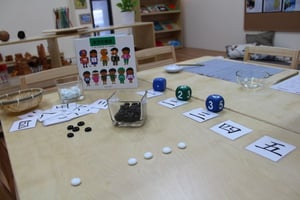-1.png)
EtonHouse Singapore
“I thought that my days of learning Mandarin were far behind me, but then I became a mum and I found myself thrust back into a world of Chinese characters and hanyu pinyin,” shared Mdm Tan, mum of a Primary 2 daughter, candidly. “The only difference is that the stakes feel higher than before because it now involves my child, and which parent doesn't want their child to succeed?” added Mdm Tan.
This is a common worry with most parents as we navigate through the pros and cons of all the different advice (start Chinese class at 18 months old!) and parenting philosophies (don’t worry, your child will learn, there’s no need for extra classes) to find what works for your family. Take heart that you’re not alone. Every parent you encounter is probably going through the same thing you are.
All parents want to build a solid learning foundation for their children to realise their potential. But what do you do when you’re not completely certain of the basics yourself? Whether you had taken Mandarin in school or only hear Mandarin words in passing, it can be daunting to be put in a position to educate your child in a language you’re not at ease with.
What you can do: How about thinking back to when you were learning Mandarin, are there things that could have helped you understand the language more fully? It could be learning rules of the hanyu pinyin system and its four tones, what the radicals in Chinese characters stand for, or being comfortable conversing in Mandarin with others. Use that as a starting point to grow your own confidence in the language and impart that knowledge to your children.
- “What’s this word in Mandarin?”
You’ve succeeded in getting your child eager to learn Mandarin. Now they want to know the Mandarin word for all their favourite toys, animals, fruit, games and anything else that comes to mind. They ask you with utmost confidence that you’ll have the answer. After all, aren’t Mummy and Daddy supposed to know everything?
What you can do: You could react like a deer caught in headlights, but let’s look at this as the perfect opportunity to demonstrate to your children that learning is for all ages. Get an English-Chinese dictionary or download an app (e.g. (KTdict C-E)). Showing your child your willingness to learn Mandarin together is not only a great chance to bond with your child, but also encourages in them a positive attitude towards learning.
- Preparing your child for major examinations
It’s no secret that the school system in Singapore is rigorous. You may have started writing Chinese compositions when you were in Primary 4, but your child could be doing that same thing in Primary 2. While we want our children to enjoy learning, tests and examinations are still used to measure academic progress – albeit to a lesser extent.
What you can do: It’s useful to understand the examination requirements early in your child’s school life, not to strike fear into their hearts, so that you’re better able to guide and manage their education together with their teachers. For example, the new PSLE format starting in 2017 will see the Chinese oral examination changed from students having to describe a picture to watching a video and having a conversation about the video clip. With this in mind, you could watch short clips at home with your child and talk to them about it, making it more natural for them to talk to the examiner when the time comes.
- Enrichment classes - To send or not to send?

There are Mandarin classes for almost all ages, starting from as young as a year old. Some are parent-accompanied classes, others are drop-off ones. Some are multi-sensory with speech and drama, others are more structured with mock examinations and revisions.
What you can do: The decision to send your child for enrichment classes is unique to each child. Some children thrive in classes, others are weeping at the door while clinging to your leg. Thankfully there are schools which offer trial sessions to see how your child responds to the class, before you commit to signing them up for a whole term. If your child loved the class, fantastic! If you sense that they’re not ready for it, it’s probably best to wait a couple of months before trying again. The last thing you want is for your child to associate negative feelings with learning the Chinese language.
It can be easy to get caught up in the hubbub of making sure your child has the proper Mandarin foundation to start Primary School, that they’re not going to fall behind in class and that they’re well on their way to excelling the PSLE.
What you can do: However concerned and anxious you may be about your child’s academic excellence, it’s also important to realise that every child has his or her own strengths and weaknesses. Too often, parents can be so focused on how to improve their child’s results by pointing out the mistakes, that they forget to celebrate and acknowledge what was done right. Being positive not only builds your child’s confidence, it also helps you to be less stressed out.
At the end of the day, Mandarin is so much more than just a school subject. It’s a life skill: a way to communicate with others and a chance to learn and understand a different culture. With that in mind, your child can then view Mandarin as something to be enjoyed, not endured.




